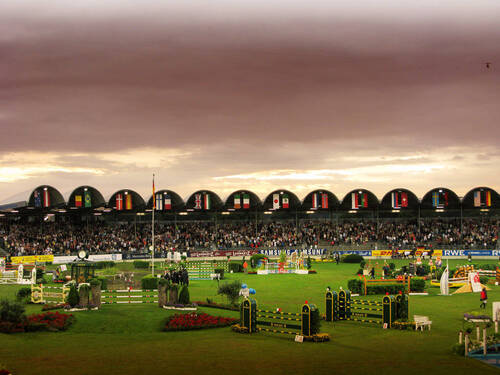The International Jumping Riders Club since 1977 is the voice of the showjumping riders from around the world.
International Jumping Riders Club
Aachen, equestrian querelle
Is it a German habit to act different? Difficult to say, however no one can argue against the fact that every time Germany takes decisions it causes ripples in the equestrian world. Last June Germany decided to retire from the San Gallen Nations Cup, a choice with no small consequences in the Nations Cup’s ranking and the final which took place in Barcelona. In dressage, Germany pronounced differently on doping FEI rules, suspending the rider Isabell Werth for six months. At the beginning of the new year Germany surprised us once again by renouncing to the Furusiyya FEI Nations Cup in Aachen.
The equestrian show will still be one of the main CSIO in the world with its own Nations Cup, but it will not count for the FEI first division. This will not stop Aachen inviting the best teams, remaining one of the best shows in the world as it has always been since 1929. We do however believe that the absence of Aachen from the circuit is something that has consequences for the entire sport. The day that the FEI published the Nations Cup calendar, the organiser of the German CSIO, Frank Kampermann, declared: “It’s better for us: we will have much more flexibility”.
As the IJRC, we are regretful about this solution and question why a more in depth analysis has not been considered. In the past season the FEI focused its attention on the prestige of the Furusiyya FEI Nations Cup and we don’t understand why they should accept to renounce to one of the circuit’s historical shows. The FEI press release spoke about commercial requests that did not match. John Roche didn’t add much more to the picture: “There is not so much to say. They could not meet our requirements, there was no other way forward this year”. But how can this be possible? Every year on the last day of the show, the German CSIO sells out for the next season. It is more likely that Aachen could not renounce to the agreements signed with the national federation and Rolex, sponsor of the event. We are assuming this because, otherwise, we cannot understand what happened. On the German Federation’s side, Soenke Lauterbach said: “We have tried until the very last day to get FEI and Aachen continue their discussion in order to find a solution. But while Aachen was flexible with regards to the commercial requirements to a certain degree, the FEI made clear that for them there was no room to negotiate”.
We know that previously events like Geneva and ‘s-Hertogenbosch have maintained Rolex as their sponsor, leaving the FEI World Cup series. Calgary will also host his own Nations Cup outside the series. We question about the supremacy of one sponsor in equestrianism and think a more “liberal sponsor market” will benefit the sport. “It is for sure a big pity that Aachen is no more in division one – says Max Kühner, representing IJRC in the FEI Jumping Committee – everybody in the FEI Jumping committee thinks so. What I can say is that Aachen might have asked for special conditions. We can easily understand that the contrast between the two sponsors in the watch business could be part of the economical requirements, which did not fit together. At the same time – he continues – I strongly believe that each country must have the same opportunities and that there must not be extra positions for Germany. I’m always serving the sport’s prospective”.
What is sure is that the 2014 circuit will miss an important show, and Germany will miss its first division show, which has been assigned to the Belgian CSIO of Lummen. Back to square one: Is Germany right? Is it better to do it your own way or to submit to the rules?

